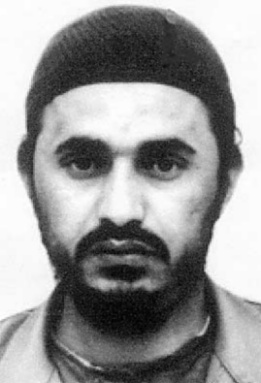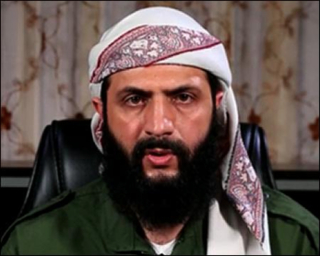
Mohamed Salah al-Din al-Halim Zaidan, commonly known by his nom de guerreSaif al-Adel, is a former Egyptian Army officer and explosives expert who is widely understood to be the de facto leader of al-Qaeda. Al-Adel fought the Soviets as an Afghan Arab before becoming a founding member of the al-Qaeda organization. He is a member of Al-Qaeda's Majlis al-Shura and has headed the organization's military committee since the death of Muhammad Atef in 2001. He is currently known to live in Iran along with several other senior members of the group.

Jama'at al-Tawhid wal-Jihad, abbreviated as JTJ or Jama'at, was a Salafi jihadist militant group. It was founded in Jordan in 1999, and was led by Jordanian national Abu Musab al-Zarqawi for the entirety of its existence. During the Iraqi insurgency (2003–11), the group became a decentralized network with foreign fighters with a considerable Iraqi membership.
Abu Anas al-Shami was a senior leader in the Jama'at al-Tawhid wal Jihad militant group during the Iraq War. He was a Palestinian from Tulkarm city in the West Bank, born in Kuwait in 1969.
Abu Muhammad al-Maqdisi, or more fully Abu Muhammad Assem al-Maqdisi, is the assumed name of Assem ibn Muhammad ibn Tahir al-Barqawi, an Islamist Jordanian-Palestinian writer. A Salafi jihadi ideologue, he has popularized many of the most common themes of radical Islam today, like the theological impetus given to the notion of Al Wala' Wal Bara', being the first to declare the Saudi royal family to be apostates or considering democracy a religion, and thus whoever believes in it to be an apostate, but he is best known as the spiritual mentor of Jordanian jihadist Abu Musab al-Zarqawi, the initial leader of al-Qaeda in Iraq. However, an ideological and methodical split emerged between Maqdisi and Zarqawi in 2004 due to Zarqawi's takfeer proclamations towards all the Shia populations in Iraq. Maqdisi opted for a more cautious approach towards targeted Shia killings, attempting to stop Zarqawi's radical ideological movement before Zarqawi's methods become counter-productive.
Fouad Hussein is a Jordanian journalist and author of the 2005 Arabic language book Al-Zarqawi: The Second Generation of Al Qaeda. It is based on interviews with senior Islamic militants, including Abu Musab al-Zarqawi, the late leader of Al-Qaeda in Iraq, and Saif al-Adel, a high-ranking member of al-Qaeda and Islamic Jihad. Hussein first met Zarqawi and Zarqawi's mentor Abu Muhammad al-Maqdisi in 1996 in a Jordanian jail. At the time, Hussein was being held as a political prisoner. Since its release, Hussein's book has garnered heavy press coverage and analysis in Iran. In the book Hussein describes what he says is al-Qaeda's grand strategy, a sequence of events that spreads over nearly 20 years.

Abu Musab al-Zarqawi, born Ahmad Fadeel al-Nazal al-Khalayleh, was a Jordanian militant jihadist who ran a training camp in Afghanistan. He became known after going to Iraq and being responsible for a series of bombings, beheadings, and attacks during the Iraq War, reportedly "turning an insurgency against US troops" in Iraq "into a Shia–Sunni civil war". He was sometimes known by his supporters as the "Sheikh of the slaughterers".

It is believed that members of Al-Qaeda are hiding along the border of Afghanistan and northwest sections of Pakistan. In Iraq, elements loosely associated with al-Qaeda, in the Jama'at al-Tawhid wal-Jihad organization commanded by Abu Musab al-Zarqawi, have played a key role in the War in Iraq.
In the context of political aspects of the religion of Islam, political quietism has been used to refer to the religiously-motivated withdrawal from political affairs or skepticism that mere mortals can establish a true Islamic government. It is the opposite of political Islam, which holds that the Islamic religion and politics are inseparable, and Muslims should be fighting to establish true Islamic government.
The Camp Chapman attack was a suicide attack by Humam Khalil Abu-Mulal al-Balawi against the Central Intelligence Agency facility inside Forward Operating Base Chapman on December 30, 2009. One of the main tasks of the CIA personnel stationed at the base was to provide intelligence supporting drone attacks in Pakistan. Seven American CIA officers and contractors, an officer of Jordan's intelligence service, and an Afghan working for the CIA were killed when al-Balawi detonated a bomb sewn into a vest he was wearing. Six other American CIA officers were wounded. The bombing was the most lethal attack against the CIA in more than 25 years.
Humam Khalil Abu-Mulal al-Balawi was a Jordanian doctor and a triple agent suicide bomber, who was loyal to Islamist extremists of al-Qaeda, and who carried out the Camp Chapman attack, which was a suicide attack against a CIA base near Khost, Afghanistan on 30 December 2009.
Abdullah Said al-Libi was described as being an al Qaeda operational leader in Pakistan. He is reported to have previously served in the Libyan military. He led an al-Qaeda paramilitary force. Said al-Libi was killed in a drone strike on 17 December 2009 in North Waziristan. In April 2009 he had released a statement where he identified himself as the leader of al Qaeda's efforts to take control of Khorasan - an ancient Islamic province that included Afghanistan, Pakistan, and some neighboring areas.

Manhunt: The Search for Bin Laden is a 2013 documentary film directed by Greg Barker that explores the Central Intelligence Agency's investigation of Osama bin Laden, starting from 1995 until his death in 2011. It premiered on HBO on May 1, 2013, two years after the mission that killed bin Laden. The documentary features narratives by many of the CIA analysts and operatives who worked over a decade to understand and track bin Laden, and includes archival film footage from across Washington, D.C., Pakistan, Saudi Arabia and elsewhere in the Middle East. It also features extensive and rarely seen footage of Al-Qaeda training and propaganda videos, including video suicide notes from various terrorists who later worked as suicide bombers.

Ahmed Hussein al-Shar’a, known by his nom de guerre as Abu Mohammad al-Julani, is a Syrian militant leader who is the current commander-in-chief of the militant group Tahrir al-Sham.
Muhammad Surur bin Nayif Zayn al-'Abidin was a former member of the Syrian Muslim Brotherhood. He is credited with establishing the Salafi Islamist movement known as Sururism, which combines "the organisational methods and political worldview of the Muslim Brotherhood with the theological puritanism of Wahhabism." This movement is noted for advancing a politicized version of Wahhabism in Saudi Arabia. Surur called for non-violent criticism of Muslim rulers but opposed efforts to overthrow regimes in Muslim countries, viewing such actions as fitna. In 1984, he authored the widely read anti-Shia book Wa Ja'a Dawr al-Majus. This book posits the Iranian Revolution as a strategy for Shiite domination of the Middle East. His writings influenced Abu Musab al-Zarqawi, the leader of Al-Qaeda in Iraq.

Samir Hijazi, known as Abu Humam al-Shami or Faruq al-Suri, is a Syrian militant and soldier who was the military chief of al-Qaeda's Syrian affiliate al-Nusra Front. He became the head of the Hurras al-Din in February 2018, though he was replaced by Khalid al-Aruri.
Abdullah Abd al-Rahman Muhammad Rajab Abd al-Rahman, known as Ahmad Hasan Abu al-Khayr al-Masri, was an Egyptian al-Qaeda leader who has been described as the general deputy to al-Qaeda leader Ayman al-Zawahiri.
Khalid Mustafa Khalifa al-Aruri, known as Abu al-Qassam, was a Palestinian-Jordanian Islamic militant and a member of al-Qaeda who was the leader of the Hurras al-Din.
Sari Muhammad Hasan Shihab, known as Abu Khalid al-Muhandis, was a Jordanian national born in 1973 who was a member of the different groups that were founded by Abu Musab al-Zarqawi. He was one of the initial members of the Jama'at al-Tawhid wal-Jihad organization which was founded by al-Zarqawi in 1999. Shihab was also known as Abu Safar and Suhayb. Shihab was one of five al-Qaeda leaders who were released by Iran in March 2015 in exchange for a kidnapped Iranian diplomat in Yemen. The other four were Saif al-Adel, Abdullah Ahmed Abdullah, Abu Khayr al-Masri and Khalid al-Aruri.

Nada Glass Bakos is an American former Central Intelligence Agency (CIA) analyst and targeting officer who was involved in a number of notable counterterrorism operations during her career. She was part of a group of CIA analysts studying Al Qaeda and its leader, as portrayed in the 2013 HBO documentary, Manhunt: The Search for Bin Laden. She also served as the Chief Targeting Officer in the search for Abu Musab al-Zarqawi, the leader of Al Qaeda in Iraq and predecessor of ISIS. After 10 years, she left the CIA.
The origins of the Islamic State group can be traced back to three main organizations. Earliest of these was the "Jamāʻat al-Tawḥīd wa-al-Jihād" organization, founded by the Jihadist leader Abu Mus'ab al-Zarqawi in Jordan in 1999. The other two predecessor organizations emerged during the Iraqi insurgency against the U.S. occupation forces. These included the "Jaish al-Ta'ifa al-Mansurah" group founded by Abu Omar al-Baghdadi in 2004 and the "Jaysh Ahl al-Sunnah wa’l-Jama’ah" group founded by Abu Bakr al-Baghdadi and his associates in the same year.








